Held every year on 20 June, World Refugee Day marks a key moment to commemorate the strength, courage and perseverance of millions of refugees.
One in every 113 people have been forced to flee their homes because of war or persecution. More than just numbers – they are all individual people with dreams for their families. Behind the statistics are children who want to go to school but cannot. Or they’re mothers who are still wondering if their sons and daughters are still alive. They’re fathers who are wondering how to provide for their family’s future. Read Caritas joint ecumenical statement for the World Refugee Day 2017.
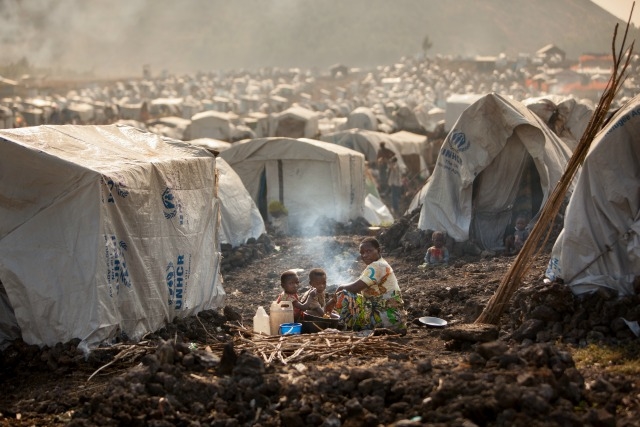
A family eats dinner at the refugee camp Mugunga 3 in Goma, North Kivu in Congo. Half a million people have fled the Democratic Republic of Congo, while 3.7 million people forced from their homes remain inside the country. 10,000 Caritas volunteers carry out a range of emergency and development programming.
“Physical and policy-made fences are a failure and belong to the past. Our future lies in tackling the genuine root causes of what makes people flee their homes and, in the meantime, put in place humane and dignifying solutions to help those knocking at our door. The Catholic Church is clear, we cannot continue looking away when people are so desperate that they are ready to put their children’s and their own life at risk to reach a better life.” Msgr. Luc Van Looy, president of Caritas Europa.
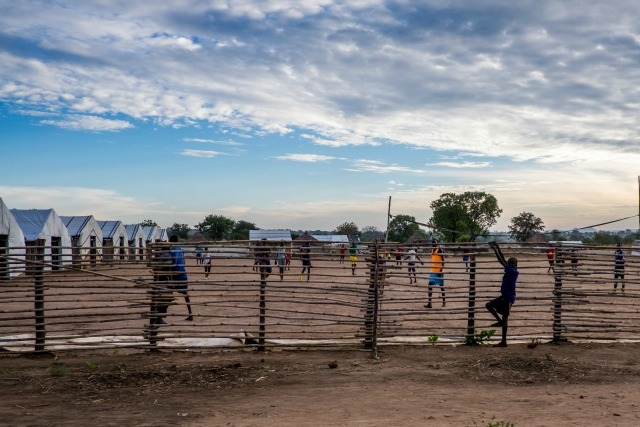
Playground at the Nyumanzi Transit Camp in Adjumani, Uganda. The South Sudan crisis has forced nearly 1.8 million people to flee, half to Uganda. Caritas works with South Sudanese refugees there, providing seeds and tools so that they can build their own future.
“With the development of new international frameworks – Global Compacts on Migrants and on Refugees in 2018, States should not only ensure a more effective responsibility-sharing in response to large movements, but they should also accept the opportunity to recognise and emphasise the significant contributions that refugees and migrants make to their host communities, in order to make true solidarity a lived reality for those seeking protection and those following their obligations to give it alike.” Joint Faith-Based Organisations’ Statement on World Refugee Day, 2017
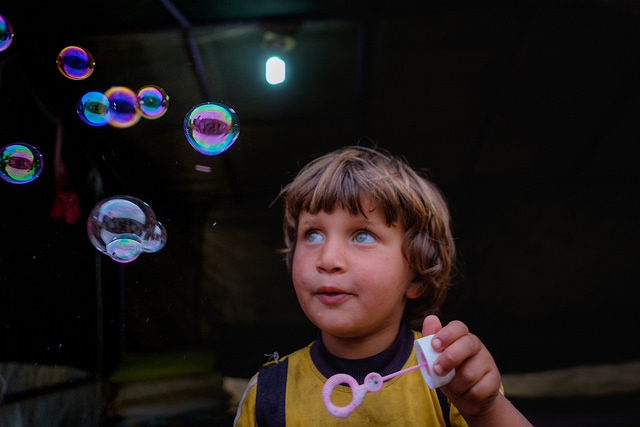
Syrian refugees find shelter in tents on a field in Salihli in the Aegean region of Turkey. Caritas has reached tens of thousands of families in Syria, Lebanon, Jordan and Turkey. Caritas provides food, emergency shelter, free healthcare and medical support, blankets, clothing and household goods as well as counseling services and child-friendly places for children to play and learn.
“If the dream of a peaceful world is shared by all, if the refugees’ and migrants’ contribution is properly evaluated, then humanity can become more and more of a universal family and our Earth a true common home.” Cardinal Luis Antonio Tagle, Caritas Internationalis president.
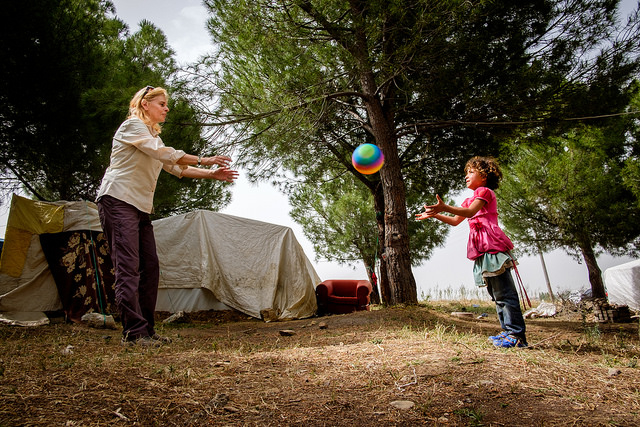
Syrian refugees find shelter in tents in Gölmarmara, Manisa Province in the Aegean region of Turkey. Caritas has been campaigning through its Syria: Peace is Possible initiative for an end to the fighting, for increased humanitarian aid and to protect human rights, grant safe passage for all those trying to flee the violence.
“As the Catholic Church, we must take up again the mandate of being Samaritans, welcoming with Christian tenderness so that we don’t turn our backs on our brothers and so that we show the most authentic signs of hospitality and accompaniment of men and women migrants and refugees.” Msgr. Alvaro Ramazzini, bishop of Huehuetenango, Guatemala.
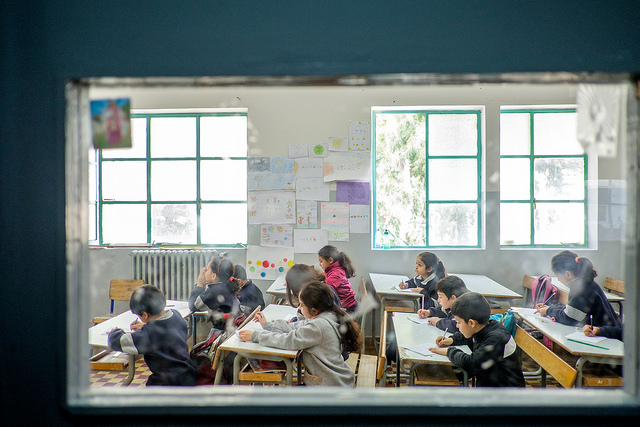
Public school in Broummana, Lebanon. With the huge influx of refugees the demand for education has surged and the Lebanese authorities are now offering two “shifts” at school – one in the morning for Lebanese children and one in the afternoon for Syrian children. Caritas offers educational support – stationary, books, bags and transport – for 300,000 children.
“Walling ourselves off from the world – whether with barbed wire, bricks or visa denials – is not going to solve our national security problem. Instead, we must work together to bring peace where there is fighting, to bring security where there is violence, to bring prosperity where there is poverty.” Sean Callahan, CEO of CRS and vice president of Caritas Internationalis.
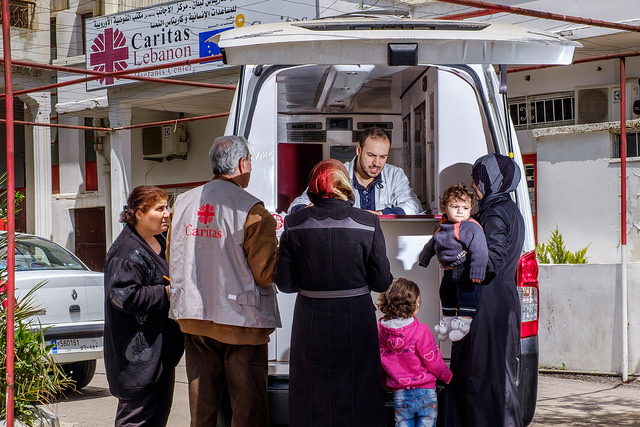
Caritas Lebanon provides healthcare to 10,000 Syrian refugees from it’s mobile clinics, like this one in Taalabaya. Caritas helps in particular pregnant and new mothers, disabled people and large families. Caritas also provides food, shelter and protection.
“If I had a dream, it would be to go back to Syria. I dream to be reunited with my family. I’m hoping to be a doctor when I grow up so I can help people like my mother, who suffers from mental health problems. Even though I’m a refugee in Turkey, I think it’s still possible. If you want something, you should really go for it.” Miriam, 15 years old.
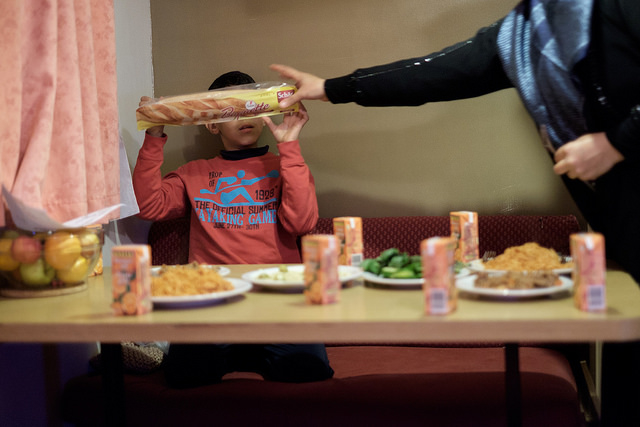
Ali Mahmood and his wife Nesreem come from Baghdad. Their son has diabetes since there was an attack on their home. Refugees are getting temporary shelter at Camping Polleur, situated close to Verviers in the Belgian Ardennes.
“We were professionals, my husband an engineer and myself doctor. Our families were Shia and Sunni. When the sectraian fighting began in Iraq, we were targeted and had to leave. We wanted to go back, but after my uncle was killed it’s no longer possible. Our future has been destroyed there. I’d like to study medicine here in Turkey so I can practise as a doctor again and get my daugther through her education.” Aiya, 26 years old, Iraqi refugee.
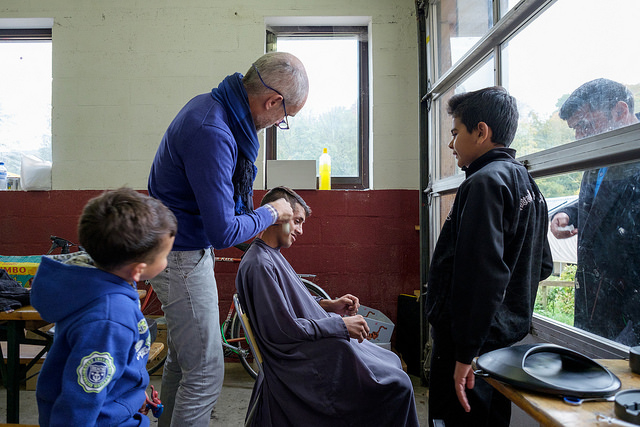
Iraqi refugee Ahmed Jabar, 19 years, has his hair cut like the footballer Ronaldo by a volunteer. Refugees are getting temporary shelter at Camping Polleur, situated close to Verviers in the Belgian Ardennes. Caritas organisations in France, Austria, Greece, Croatia, Italy, Serbia, Slovenia, Macedonia, Hungary and elsewhere have responded with speed to the biggest mass migration of people the world has seen since World War II.
“Lord, give me strength to keep moving. Give me enough food for that strength. Evil has cast me out from my homeland. My old home is behind me and destroyed. I have to search for a new home. Lord, take from my mind my dying family, and fill it with hope for a new and caring family, a place where I can work to earn my bread, friends who will welcome me and help me, a new home where I can build a new life.” Kathy McVay from CAFOD prayer resources
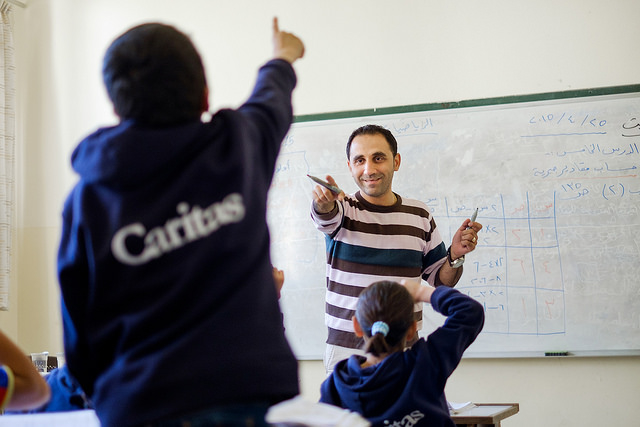
At the school in Fuhais, Balqa, Jordan, Syrian children get non-formal education. Caritas Jordan provide opportunities for Syrian refugee children including kindergarten classes, catch-up classes, remedial classes and child-friendly spaces.
“Before this complex panorama, I feel the need to express particular concern for the forced nature of many contemporary migratory movements, which increases the challenges presented to the political community, to civil society and to the Church, and which amplifies the urgency for a coordinated and effective response to these challenges. Our shared response may be articulated by four verbs: to welcome, to protect, to promote and to integrate.” Pope Francis
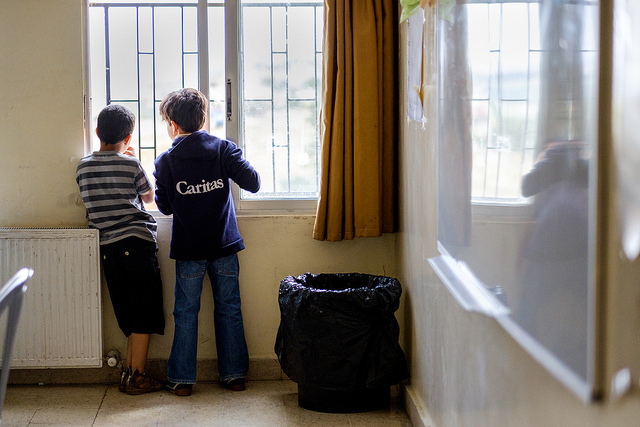
School in Madaba, Jordan supported by Caritas. The team of volunteers provide educational support, psychosocial activities, counselling, and interventions to meet the emotional and mental health needs of refugee children.
Over to you
In September 2016, global leaders agreed to work towards a Global Compact for refugees in 2018 where all parts of society stand together #WithRefugees and do their fair share instead of leaving individual states to bear the burden of mass forced displacement. You can call on these governments to keep their promise by signing the UN refugee agency’s petition.
The new Caritas global campaign – Share the Journey – will begin in September 2017 and will run for two years. The campaign – to raise awareness of migration – answers Pope Francis’ repeated calls to promote what he calls “the culture of encounter”. By strengthening the bonds between communities and migrants, or potential migrants and returnees, we will also strengthen the bonds of the human family. Please join us in September by contacting your local Caritas.
All images by award winning photojournalist Isabel Corthier from her work with Caritas.
